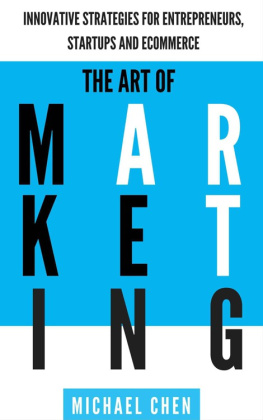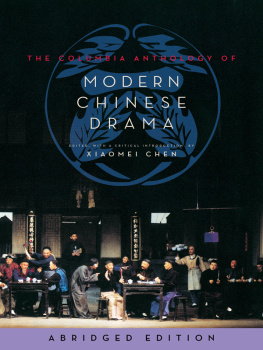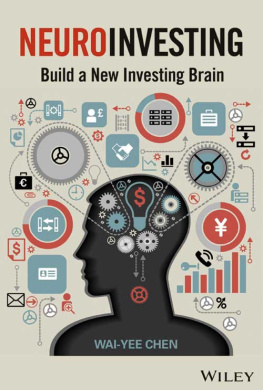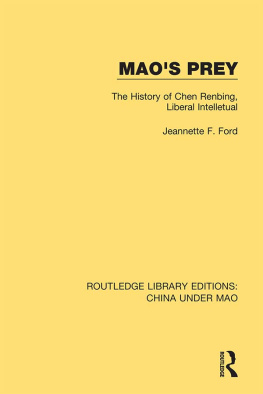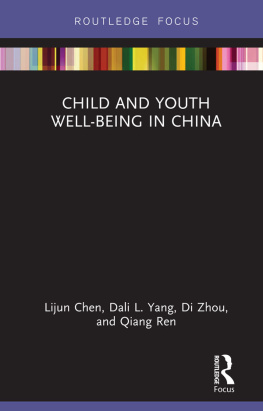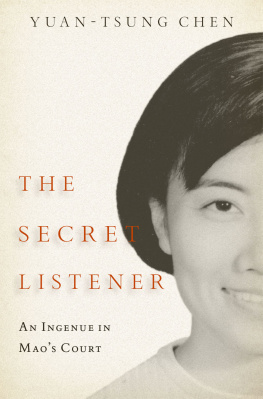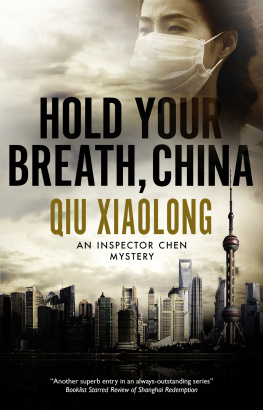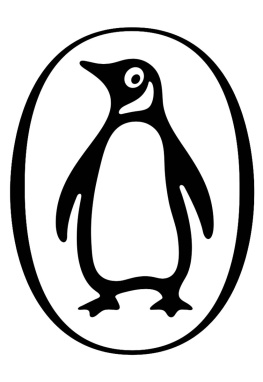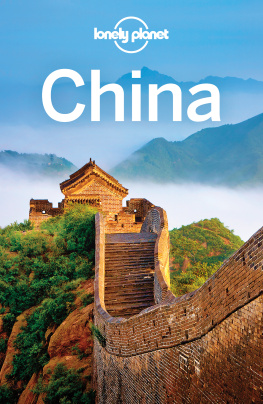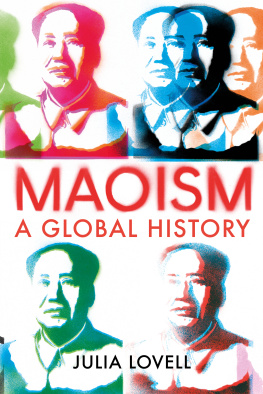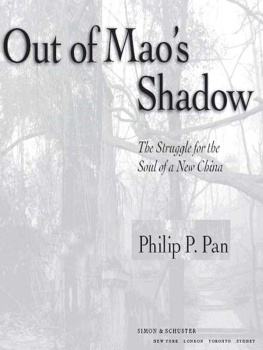Chen - Maos China and the cold war
Here you can read online Chen - Maos China and the cold war full text of the book (entire story) in english for free. Download pdf and epub, get meaning, cover and reviews about this ebook. City: Chapel Hill, year: 2006;2001, publisher: The University of North Carolina Press, genre: Politics. Description of the work, (preface) as well as reviews are available. Best literature library LitArk.com created for fans of good reading and offers a wide selection of genres:
Romance novel
Science fiction
Adventure
Detective
Science
History
Home and family
Prose
Art
Politics
Computer
Non-fiction
Religion
Business
Children
Humor
Choose a favorite category and find really read worthwhile books. Enjoy immersion in the world of imagination, feel the emotions of the characters or learn something new for yourself, make an fascinating discovery.

Maos China and the cold war: summary, description and annotation
We offer to read an annotation, description, summary or preface (depends on what the author of the book "Maos China and the cold war" wrote himself). If you haven't found the necessary information about the book — write in the comments, we will try to find it.
Chen: author's other books
Who wrote Maos China and the cold war? Find out the surname, the name of the author of the book and a list of all author's works by series.
Maos China and the cold war — read online for free the complete book (whole text) full work
Below is the text of the book, divided by pages. System saving the place of the last page read, allows you to conveniently read the book "Maos China and the cold war" online for free, without having to search again every time where you left off. Put a bookmark, and you can go to the page where you finished reading at any time.
Font size:
Interval:
Bookmark:
MAOS CHINA AND THE COLD WAR
THE NEW COLD WAR HISTORY
John Lewis Gaddis, editor
2001
The University of North Carolina Press
All rights reserved Manufactured in the United States of America Set in Janson and Meta types by Tseng Information Systems The paper in this book meets the guidelines for permanence and durability of the Committee on Production Guidelines for Book Longevity of the Council on Library Resources.
Library of Congress Cataloging-in-Publication Data Chen Jian.
Maos China and the cold war /Chen Jian.
p. cm. (The new cold war history)
Includes bibliographical references and index. ISBN 0-8078-2617-0 (alk. paper) ISBN 0-8078-4932-4 (pbk. : alk. paper) 1. ChinaForeign relations1949 2. Cold War. I. Title. II. Series.
DS777.8 .C4314 2001
327.51dc21 00-067240
05 04 03 02 01 5 4 3 2 1
Versions of Chapters 1, 2, 3, 5, and 8 appeared earlier, in somewhat different form, respectively, in Chen Jian, China in 1945: From Anti-Japanese War to Revolution, in 1945 in Europe and Asia: Reconsidering the End of World War II and the Changes of the World Order, edited by Gerhard Krebs and Christian Oberlnder (Tokyo: Deutschen Institut fr Japanstudien der Philipp-Franz-von-Siebold-Stiftung, 1997) (reprinted by permission); Chen Jian, The Myth of Americas Lost Chance in China: A Chinese Perspective in Light of New Evidence, Diplomatic History (Winter 1997) (reprinted by permission); Chen Jian and Yang Kuisong, Chinese Politics and the Collapse of the Sino-Soviet Alliance, in Brothers in Arms: The Rise and Fall of the Sino-Soviet Alliance, 19451963, edited by Odd Arne Westad (Washington, D. C.: Woodrow Wilson Center Press and Stanford: Stanford University Press, 1998) (reprinted by permission); and Chen Jian, China and the First Indo-China War, 19501954, China Quarterly, no. 133 (March 1993), and Chen Jian, Chinas Involvement in the Vietnam War, 19641969, China Quarterly, no. 142 (June 1995) (reprinted by permission of Oxford University Press).
For my wife, Hong Hong
CHAPTER 1
The Chinese Civil War and the Rise of the Cold War in East Asia, 19451946
CHAPTER 2
The Myth of Americas Lost Chance in China
CHAPTER 3
Maos Continuous Revolution and the Rise and Demise of the Sino-Soviet Alliance, 19491963
CHAPTER 4
Chinas Strategies to End the Korean War, 19501953
CHAPTER 5
China and the First Indochina War, 19501954
CHAPTER 6
Beijing and the Polish and Hungarian Crises of 1956
CHAPTER 7
Beijing and the Taiwan Strait Crisis of 1958
CHAPTER 8
Chinas Involvement in the Vietnam War, 19641969
CHAPTER 9
The Sino-American Rapprochement, 19691972
China
Korea and Chinas Northeast
Indochina
Eastern China and the Taiwan Strait
Soviet Red Army soldiers with Chinese Communist soldiers in Manchuria
Mao Zedong with Anastas Mikoyan
Stalin and Mao Zedong
Draft of Mao Zedongs telegram to Stalin, 2 October 1950
Mao Zedong and Soviet leader Nikita Khrushchev at the celebration rally for the fortieth anniversary of the Russian Bolshevik revolution
Mao Zedong greets Nikita Khrushchev at the Beijing airport, 31 July 1958
Chinese Peoples Volunteers commander Peng Dehuai and North Korean Communist leader Kim Il-sung
Chinese delegation attending the Geneva conference of 1954
Zhou Enlai speaking to Hungarian Communist leader Jnos Kdr
Chinese-American ambassadorial talks at Warsaw
Chinese party and government delegation visiting Hanoi
Chinese soldiers patrolling at Zhenbao Island
Zhou Enlai and Aleksei Kosygin at the Beijing airport
Mao Zedong and Edgar Snow at the top of Tiananmen
Chinese Ping-Pong player Zhuang Zedong and American player Glenn Cowen
Zhou Enlai greets Richard Nixon at the Beijing airport
Mao Zedong and Richard Nixon at Zhongnanhai, Beijing
Table 1. Chinas Military Aid to Vietnam, 19641975
The completion of this book would have been impossible without the generous institutional and financial support I have received in the past decade. In particular, I would like to acknowledge a Norwegian Nobel Institute fellowship in 1993, a Dr. Nuala McGann Drescher Leave Program Fellowship from the State University of New York in fall 1994, a summer fellowship and a two-year special research grant from Southern Illinois University in Carbondale in 1996 and 199799, and a senior fellowship at the United States Institute of Peace in 199697.
John Lewis Gaddis, Michael Schaller, Jonathan Spence, and Odd Arne Westad read the entire manuscript and provided me with critical comments and suggestions. William Turley and David Wilson, my teachers and colleagues at Southern Illinois University, have constantly served as sources of friendship and unfailing support. Jim Hershberg, David Wolff, and Christian Ostermann, who have directed the Cold War International History Project at the Woodrow Wilson International Center for Scholars for the past decade, helped me in many waysincluding providing encouragement, offering forums for me to test my ideas, and, together with the staff at the National Security Archive in Washington, D.C., sharing with me newly declassified Cold War documentation. Charles Bailey, David Tamerin, and David Werlich, the three department chairmen with whom I have worked at SUNY-Geneseo and Southern Illinois University, have been most supportive as colleagues and friends. Zhang Shuguang, Michael M. Sheng, and Zhai Qiang, fellow Chinese scholars working on Cold War studies in the United States, as well as Vladislav Zubok, a renowned Russian Cold War scholar who shares a birthday with me, have enhanced my understanding of the Cold War history in many discussions over the years.
I also wish to thank a number of friends, colleagues, and fellow scholars who either have read part of the manuscript during various stages of its making and offered critical comments or have provided support in other valuable ways: William Burr, Warren Cohen, Thomas Christensen, Roger Dingman, John Garver, Leszek Gluchowski, He Di, Michael Hunt, Li Haiwen, Geir Lundestad, Niu Jun, Krzysztof Persak, Shen Zhihua, R. B. Smith, Tao Wenzhao, Marc Trachtenberg, Nancy Berncropf Tucker, Xu Yan, Xue Litai, Yang Kuisong, Marylyn Young, Kathryn Weathersby, and Zhang Baijia. Brian Deason, Hu Shaohua, Li Di, and David Snyder served as my research assistants at Southern Illinois University and the U.S. Institute of Peace and have contributed to the completion of this project.
Earlier versions of several chapters were previously published: Chapter 1 first appeared in Gerhard Krebs and Christian Oberlnder, eds., 1945 in Europe and Asia: Reconsidering the End of World War II and the Change of the World Order (Tokyo and Berlin: Deutsches Institut fr Japanstudien, 1997); Chapter 2 in the winter 1997 issue of Diplomatic History; Chapter 3 (which I coauthored with Yang Kuisong) in Odd Arne Westad, ed., Brothers in Arms: The Rise and Fall of the Sino-Soviet Alliance, 19491963 (The Woodrow Wilson Center Press and Stanford University Press, 1999); and Chapters 5 and 8 in the March 1993 and June 1995 issues of The China Quarterly. They all have been substantially revised and are included in this volume with permission from the original publishers.
Portions of this manuscript have been presented at various lectures, workshops, and conferences at Beijing Capital Normal University; the University of California, Berkeley; the University of California, Santa Barbara; Cambridge University; Colgate University; Columbia University; the University of Connecticut; East China Normal University; Fudan University; Hong Kong University; George Washington University; Guangxi Normal University; the Korean National Defense University; the Institute of Contemporary China in Beijing; the Norwegian Nobel Institute; Oxford University; the University of Southern California; the University of Virginia; the University of Wisconsin, Madison; the Woodrow Wilson Center in Washington, D.C.; Yale University; Yonsei University; and panels at the annual meetings of the Association for Asian Studies, the American Historical Association, Chinese Historians in the United States, and the Society for Historians of American Foreign Relations. I have benefited greatly from the comments these presentations elicited.
Font size:
Interval:
Bookmark:
Similar books «Maos China and the cold war»
Look at similar books to Maos China and the cold war. We have selected literature similar in name and meaning in the hope of providing readers with more options to find new, interesting, not yet read works.
Discussion, reviews of the book Maos China and the cold war and just readers' own opinions. Leave your comments, write what you think about the work, its meaning or the main characters. Specify what exactly you liked and what you didn't like, and why you think so.



